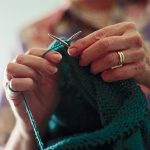
Stressed out, anxious or desperately needing to recharge? Grab some knitting needles and a pretty ball of yarn — Swedish research shows yarncraft improves mental health without medication. “Knitters have a creative leisure interest that can also help them cope with life and so improve their mental health,” said first author Joanna Nordstrand, an occupational therapist pursuing doctoral studies at the University of Gothenburg. “I’m convinced that this is part of the reason why so many people have taken up knitting these days.” Nordstrand, who is among them, explored the mental health benefits of knitting in a study recently published in the Journal of Occupational Science. For the study, she reviewed 600 posts from the online fiber arts forum Ravelry, where stitching buffs gather to discuss their hobby. Reinforcing a picture emerging from other studies, their posts revealed three ways in which knitting boosts health. The hobby helps folks unwind, gives them an identity as a knitter in a social context with low stakes. It can also bring structure to people’s lives — which benefits mental health. In the posts, some knitters said they noticed the change in their mental health: When they were knitting, thinking was clearer and easier to manage. “The nurses were wanting to give me [an antianxiety medication] until I told them that I preferred knitting for the anxiety,” one knitter… read on > read on >
































-300x200.jpg)





